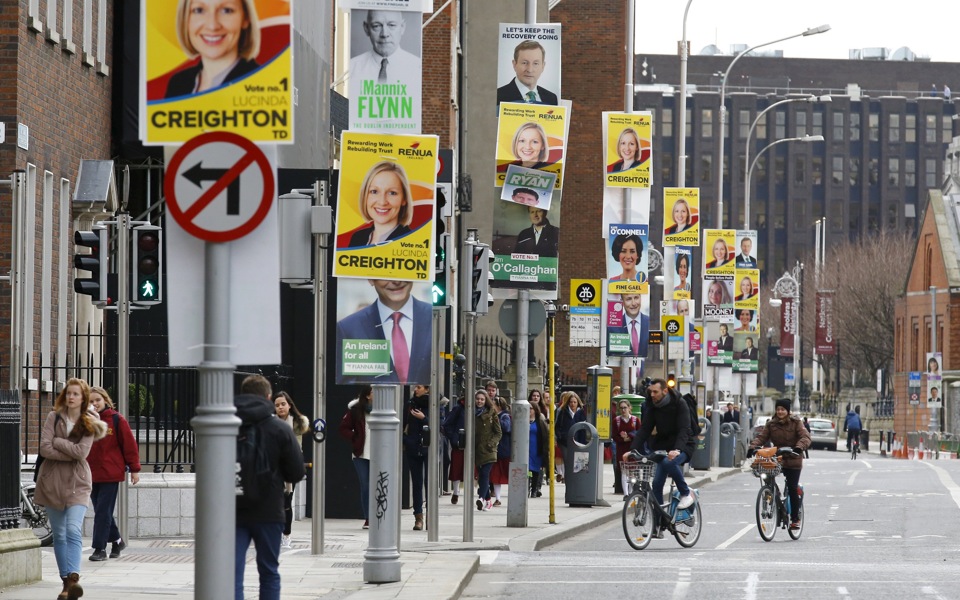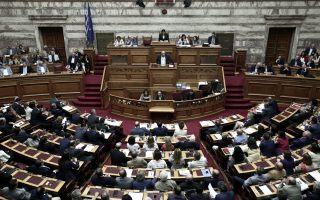The Irish election and what it means for Greece

On Friday, Ireland goes to the polls in the first general election since 2011. Voters now ask what lessons can be learned from the crisis years both at home and abroad.
Ireland and Greece
As the first two countries to enter the bailout programs backed by the troika of the European Union, European Central Bank and International Monetary Fund, the Irish and Greek economies are inextricably linked. Following the decision of the Fianna Fáil (center-right)/Green coalition government to guarantee the liabilities of the country’s six main financial institutions in 2008, Ireland was driven to the brink of bankruptcy. In November 2010, Ireland followed Greece to become only the second eurozone member to seek financial assistance from the troika, agreeing the terms of a four-year 67.5-billion-euro rescue package. In December 2013, Ireland became the first of the bailed-out economies to exit their program, while in 2015 the Organization for Economic Cooperation and Development (OECD) recorded growth in Irish GDP of 5.6, with a rate of 4.1 percent forecast for 2016.
Political figures in Ireland have developed different and often conflicting interpretations of the perceived rights and wrongs of the Greek crisis, often to shape their own political narratives and to justify policy positions.
The government in Dublin: ‘Who speaks of SYRIZA now?’
The Fine Gael (center-right)/Labour (center-left) coalition government was elected in 2011 and has implemented five years of harsh austerity. Having nervously watched the rise of the SYRIZA-led anti-austerity government, the Irish coalition has attempted to cast the Greek government’s approach to its problems as having cost the Greek people dearly, contrasting it with their own, prudent, responsible and diplomatic approach to the crisis.
Minister for Public Expenditure and Reform Brendan Howlin argues that the Irish government handled the crisis “in a very different way from the Greeks,” not doing it “with fanfare, arriving either in Downing Street or in Frankfurt with bugles blazing,” but rather working “to rebuild trust that was broken” among its peers and creditors. He claims that this approach resulted in “spectacular success” for Ireland. The minister argues that through quiet negotiation, diplomacy and cooperation, the government oversaw a number of important amendments to the original bailout agreement, including the reversal of a cut to the minimum wage, a reduction in overall cuts of 500 million euros, an improved deal on the country’s banking debt, and the reprofiling of its IMF loans. With a clear reference to the current Greek government, Howlin went on to ask, “Who speaks of SYRIZA now?”
Furthermore, in his recent book on the Greek crisis told from an Irish perspective, Richard Pine argues that while Germany was indeed the chief driver of Greece’s austerity agenda, other European governments including Ireland supported this approach. Fine Gael and Labour, as members of the center-right European People’s Party (EPP) and the center-left Socialists and Democrats (S&D) groups in the European Parliament respectively, were desperate to undermine the successes of the Greek coalition led by the anti-establishment SYRIZA party for fear of inspiring support for similar anti-austerity movements in Ireland and elsewhere.
Refuting recent criticism by former Greek finance minister Yanis Varoufakis that Irish Finance Minister Michael Noonan had fought “tooth and nail to ensure that the Greek people would not get debt relief, so he would not be taken to task for not receiving debt relief for the Irish people as he had promised,” Noonan dubbed Varoufakis’s claims as “excuses for failure,” arguing that instead of taking responsibility for Greece’s problems while he was in office, Varoufakis “went off on his motorbike to his holiday island, leaving poor and elderly Greeks going through dumpsters looking for food.”
The opposition
Meanwhile, some Irish opposition parties, particularly SYRIZA’s partners in the Confederal Group of the European United Left/Nordic Green Left (GUE/NGL) in the European Parliament, i.e. the center-left Sinn Féin and the smaller leftist Socialist Party, shouted the loudest in support of SYRIZA, calling on the Irish government to similarly stand up to the country’s international creditors. Initially, these parties missed no opportunity to vaunt the adversarial nature of SYRIZA’s approach to its creditors, claiming that the Irish government had been too quick to accede to the troika’s demands, arguing that a more combative and uncooperative approach would yield better results for Ireland.
At the “No” demonstrations in Athens in the runup to the July 2015 referendum, Irish tricolors could be seen, as Sinn Féin party activists including the high-profile front-bench finance spokesperson Pearse Doherty traveled to express solidarity with SYRIZA. However, following SYRIZA’s acceptance of the harsh terms of the third bailout agreement, this very public alignment dissipated.
Political spillovers
It is clear that there is a degree of political spillover from Greek politics into this Irish election.
Firstly, the governing parties have sought to justify the austerity of the past five years by presenting the SYRIZA-led government’s adversarial response to the crisis as a failure. This has been as much to vindicate some of their own policy choices as to undermine the threat of homegrown SYRIZA-inspired anti-austerity movements. As members of the same political families as German Chancellor Angela Merkel, French President Francois Hollande and Italian Prime Minister Matteo Renzi, the Irish government claim that their quieter, more accommodating and rule-bound approach to negotiations with their European partners achieved tangible results. After all, there was also a sense that Europe needed Ireland to succeed.
Secondly, Irish opposition parties still claim that the government should have followed the SYRIZA approach by seeking to oppose the troika’s austerity measures to obtain a better deal for Ireland. However, in the election campaign Sinn Féin in particular has come under pressure to address its previous support for SYRIZA and other left-wing movements, which are widely perceived as having failed to achieve any of the concessions they claimed they would win through increased resistance and brinksmanship at the EU level.
According to opinion polls, the incumbent government in Ireland is unlikely to be returned to power in its current form. Meanwhile, the parties and groups who have lauded the “SYRIZA approach” are also unlikely to have the numbers to govern. While different groups have sought to develop conflicting narratives of the Greek crisis to advance their own political agendas, no one group has successfully mobilized “the SYRIZA story” to its ultimate advantage.
* Barry Colfer is a PhD researcher in European politics at the University of Cambridge.





